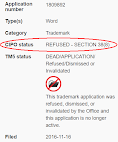On 3 May 2021 CIPO released 2 Practice Notices to address “current wait times at the examination stage”. The Notices deal with Requests for expedited examination and Measures to improve timeliness in examination. Ominously, the measures include the prospect of increased refusals by CIPO.
Section 37(1) of the Trademarks Act, RSC 1985 c. T-13 (TMA) requires Canada’s Registrar of Trademarks to refuse an application for the registration of a trademark in various circumstances, e.g. if the trademark is not registrable, if the trademark is not distinctive, etc. An application may also be refused as a consequence of a successful opposition proceeding, in accordance with TMA Section 38(12) (formerly Section 38(8)). Like any other decision of the Registrar, a refusal may be appealed to the Federal Court of Canada (see TMA Section 56).
Historically, refusals have been rare in Canadian trademark practice. CIPO’s most recent trademark .xml data (as of 3 May 2021) reveals only 1,822 applications having the status “Refused” as shown in the example on the right (click to enlarge the image). Significantly, those refusals are distributed over many decades. For example, of the 1,084,977 applications having filing dates after 1 January 2000, only 233 have the status “Refused”. That works out to a refusal rate of only 0.02%. Stated another way, there has been an average of about 11 refusals per year for applications filed in this century.
Refusals due to successful oppositions are tracked separately in CIPO’s trademark .xml data. As of 3 May 2021 the data reveals only 1,630 applications having the status “Refused - Section 38(8)” as shown in the example on the right (click to enlarge the image). Again, these Section 38(8) refusals are distributed over many decades. Of the 1,084,977 applications having filing dates after 1 January 2000, only 927 have the status “Refused - Section 38(8)”, corresponding to a refusal rate due to successful oppositions of only 0.09% (i.e. an average of about 44 refusals per year over the past 2 decades).
So what’s the big deal if refusals are so rare? It is that CIPO is signaling that refusals are likely to increase.
In its aforementioned “Measures to improve timeliness in examination” Practice Notice, CIPO acknowledges that it has received “higher than anticipated filings of trademark applications” and that although it “has built capacity by hiring more staff, this solution alone is insufficient in the short term to avoid increased wait times”. The data supports CIPO’s conclusion, as explained in my CIPO’s examination backlog—the Madrid effect post.
Indeed, the situation seems to be worsening. A comparison of CIPO’s data as of 26 April 2021 with the data as of 3 May 2021 reveals that over that one week span, application filings increased by 1,674; applications transitioning to inactive status increased by 71; and the number of examined applications increased by 982. This means that 621 applications were added to the unexamined application backlog in just that one week (1674 – 71 – 982 = 621). The backlog needs to go down, not up.
Practitioners should carefully review the “Fewer examination reports prior to refusal” section of CIPO’s new “Measures to improve timeliness in examination” Practice Notice. Of particular note are the following statements made in the Practice Notice:
- Examiners will reduce the number of reports issued
- the Office will, where reasonable, refuse trademarks in a more timely manner
- examiners will only be required to maintain a particular submission or argument once
- the applicant should make every effort to ensure that it provides a complete argument so that any submissions to the Registrar following an examiner's first report are not provided in a piecemeal manner
Given the current size of the unexamined application backlog and its apparent rate of increase, a significant uptick in refusals would be required to noticeably move the needle on the unexamined application backlog gauge in the downward direction. So brace yourself.
The new “Requests for expedited examination” Practice Notice presents some prospect of relief to trademark owners and practitioners who have patiently awaited examination of their applications. As explained in my Accelerated (expedited) Search and Examination post, according to its trademark .xml data, CIPO hasn’t granted a request for expedited examination since mid 2019—possibly due to overly enthusiastic submission of such requests. The new Practice Notice attempts to curtail such enthusiasm by restricting the situations in which expedited examination requests will be granted, e.g. ongoing or anticipated Court action involving the trademark, to combat counterfeiting situations, prevention of “severe disadvantage in online marketplaces” and preservation of foreign priority claims. As welcome as these measures are, they are unlikely to significantly impact the unexamined application backlog.



